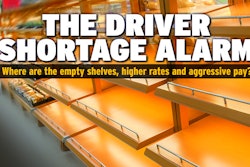Reader Alfred Brock wrote the following responding to Max Heine’s “Why trucking’s labor market isn’t really ‘broken’,” in which he discussed some of the findings of a study that cast doubt on the notion of a longstanding “shortage” of truck drivers.
I read with interest your article about why the driver market isn’t really “broken.”
You had mentioned a study that concluded there might be an unusual cause for a long-term shortage, such as a “a regulatory constraint preventing workers from entering employment or changing occupations,” which the study concluded wasn’t the case.
Recently, I moved to change occupations. I was very much keen on driving a truck. I looked into it and found there were classes near me but I couldn’t afford them and pay my bills. I then found out that there was a program here in the State of Michigan that would have made it possible for me to do just that.
I went to the state labor office and began the application procedure. The representative from the state said that money was available and there was a program but she, in particular, and the office and entire department weren’t interested in funding it. She said that people wanted to get into truck driving, then later it often turned out they didn’t want to.

So – there was a regulatory constraint. The money is there. The process is there. The people responsible for running the program are refusing to run it.
I live in Michigan. We are very close to the Canadian border. This market is flooded with Canadian drivers. Not only that, this market seems flooded with Mexican drivers.
The trucks are being driven, that’s true, but Americans are being cut out of this market.









